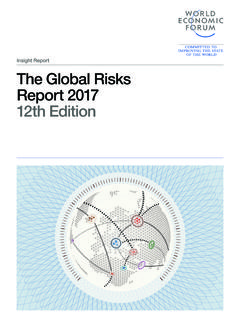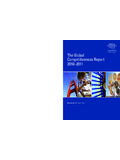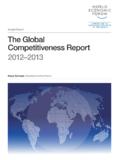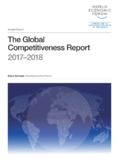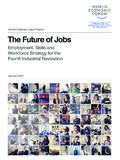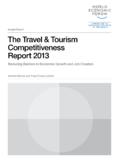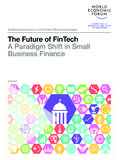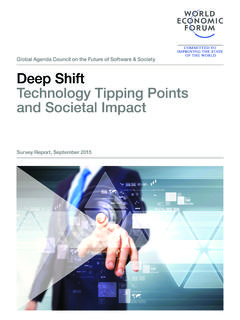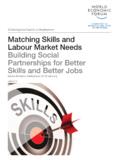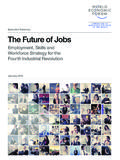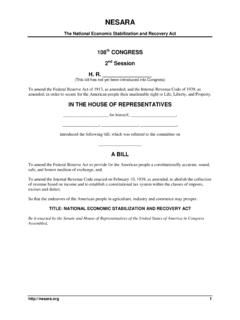Transcription of Insight Report The Global Social Mobility Report 2020 ...
1 Insight ReportPlatform for Shaping the Future of the New economy and SocietyThe Global Social Mobility Report 2020 Equality, Opportunity and a New Economic Imperative January 2020 World Economic Forum 91-93 route de la CapiteCH-1223 Cologny/GenevaSwitzerlandTel.: +41 (0)22 869 1212 Fax: +41 (0)22 786 2744E-mail: 2020by the World Economic ForumAll rights reserved. No part of this publication may be reproduced, stored in a retrieval system, or transmitted, in any form or by any means, electronic, mechanical, photocopying, or otherwise without the prior permission of the World Economic : 978-2-940631-05-6 The Report is available at: analysis presented in The Global Social Mobility Report 2020 (herein: Report ) is based on a methodology integrating the latest statistics from international organizations and a survey of findings, interpretations and conclusions expressed in this work do not necessarily reflect the views of the World Economic Forum.
2 The Report presents information and data that were compiled and/or collected by the World Economic Forum (all information and data referred herein as Data ). Data in this Report is subject to change without notice. The terms country and nation as used in this Report do not in all cases refer to a territorial entity that is a state as understood by international law and practice. The terms cover well-defined, geographically self-contained economic areas that may not be states but for which statistical data are maintained on a separate and independent basis. Although the World Economic Forum takes every reasonable step to ensure that the Data thus compiled and/or collected is accurately reflected in this Report , the World Economic Forum, its agents, officers and employees: (i) provide the Data as is, as available and without warranty of any kind, either express or implied, including, without limitation, warranties of merchantability, fitness for a particular purpose and non-infringement; (ii) make no representations, express or implied, as to the accuracy of the Data contained in this Report or its suitability for any particular purpose.
3 (iii) accept no liability for any use of the said Data or reliance placed on it, in particular, for any interpretation, decisions, or actions based on the Data in this Report . Other parties may have ownership interests in some of the Data contained in this Report . The World Economic Forum in no way represents or warrants that it owns or controls all rights in all Data, and the World Economic Forum will not be liable to users for any claims brought against users by third parties in connection with their use of any Data. The World Economic Forum, its agents, officers and employees do not endorse or in any respect warrant any third-party products or services by virtue of any Data, material or content referred to or included in this Report .
4 Users shall not infringe upon the integrity of the Data and in particular shall refrain from any act of alteration of the Data that intentionally affects its nature or accuracy. If the Data is materially transformed by the user, this must be stated explicitly along with the required source citation. For Data compiled by parties other than the World Economic Forum, users must refer to these parties terms of use, in particular concerning the attribution, distribution, and reproduction of the Data. When Data for which the World Economic Forum is the source (herein World Economic Forum ), is distributed or reproduced, it must appear accurately and be attributed to the World Economic Forum.
5 This source attribution requirement is attached to any use of Data, whether obtained directly from the World Economic Forum or from a user. Users who make World Economic Forum Data available to other users through any type of distribution or download environment agree to make reasonable efforts to communicate and promote compliance by their end users with these terms. Users who intend to sell World Economic Forum Data as part of a database or as a stand-alone product must first obtain the permission from the World Economic Forum of use and disclaimerContentsPreface _____4 Key Findings _____5 Introduction: _____8 Social Mobility : What It Is and Why it Matters _____9 The Negative Impact of Low Social Mobility on Economic Growth, Inequality and Social Cohesion _____11 Structure of this Report _____13 Benchmarking Social Mobility : The Global Social Mobility Index _____14 Conceptual Framework _____14 Pillar 1: Health _____15 Pillars 2 4: Education Access, Quality and Equity _____16 Pillar 5.
6 Technology Access _____16 Pillars 6 8: Fair Work Opportunities _____17 Pillars 9 10: Social Protection & Efficient Institutions _____17 Global Findings _____19A: Overall Global Findings _____19B: Selected Country Analysis _____23 Using Big Data to Track Inequalities _____27 Addressing Unequal Footing in Social Capital _____27 Fair Work Across Industries and Occupations _____27 Conclusions: Implications for a New Economic Agenda _____30 Improving Health Outcomes _____30 Improving Education Access and Quality, and Embracing Lifelong Learning _____30 Enhancing Social Protection _____31 Reforming Taxation and the mix of public spending _____31 The Role of Businesses _____32 Notes _____33 References _____34 economy Profiles _____37 Appendix A: Estimating the Opportunity Cost of Low Social Mobility _____202 Appendix B: Methodology and Technical Notes _____205A.
7 Computation and Composition of the Social Mobility Index _____205B. Computation of Progress Scores and Frontier Values _____207 Contributors and Acknowledgements _____2154 PrefaceGlobalization and the Fourth Industrial Revolution have generated great benefits to society, raising the living standards of billions and lifting millions out of poverty. But they have also exacerbated inequalities in our societies. Inequality is rising even in those countries that have experienced rapid growth. The Social and economic consequences of inequality are profound and far-reaching: a growing sense of unfairness, precarity, perceived loss of identity and dignity, weakening Social fabric, eroding trust in institutions, disenchantment with political processes, and an erosion of the Social contract.
8 The response must include a concerted effort to create new pathways to socioeconomic Mobility , ensuring everyone has fair opportunities for success. In this context, the World Economic Forum launches The Global Social Mobility Report 2020 to provide a much-needed assessment of the current state of the paths to Social Mobility around the world. Traditionally, Social Mobility is measured across generations, thus only capturing the effect of measures taken decades ago. The Global Social Mobility Index focuses on those policies, practices and institutions that collectively determine the extent to which everyone in society has a fair chance to fulfil their potential, regardless of their socio-economic background, the origin of their parents, or the place where they were born.
9 The launch of the Report coincides with the 50th anniversary of the Forum s Annual Meeting taking place this year under the theme Stakeholders for a Cohesive and Sustainable World and the start of a decade of delivery towards the Sustainable Development Goals and the 2030 development agenda. The results of the inaugural edition reveal that, on average, most economies are far from providing fair conditions to thrive to all their citizens. An individual s chances in life remain disproportionately influenced by their starting point their socio-economic status at birth resulting in economies and societies that too often reproduce rather than reduce historic inequalities.
10 It is the calling of this new decade one in which there is more transparency than ever before on who has opportunity and who does not to make progress on the pathways to Social Mobility . At the World Economic Forum s Platform for Shaping the Future of the New economy and Society over 200 leaders from business, government and civil society work together to deepen their understanding of complex issues, shape new standards, and drive collaborative action for systemic change on three deeply interconnected areas which all impact Social Mobility : growth and competitiveness; education, skills and work; and equality and inclusion. We invite more leaders to join us to co-shape new solutions to the challenges highlighted in this Report , working together with the urgency and ambition that the current context demands of behalf of the Forum, I want to express my gratitude to the core project team involved in the production of this Report : Thierry Geiger, Guillaume Hingel, Vesselina Ratcheva, Saadia Zahidi, as well as other colleagues from the Platform for Shaping the Future of the New economy and Society.
